 Do you search for information on social media?
Do you search for information on social media?
Did you know that Boolean search isn't just for search engines?
Many of the main social networks accept some form of traditional Boolean search operators, as well as their own, to help users identify specific information about content, brand mentions, even other users.
In this article I'll show you how to use Boolean search on Twitter, Facebook and Google+ to get more detailed information from social media.
Why Use Boolean Search?
Boolean search can help you get a better idea of what's being said about your products and services online, especially within a specific niche like an area or topic. The more specific a search is, the more accurate the information it reveals.
Let's look at how Boolean search works on Twitter, Facebook and Google+.
#1: Filter Twitter for Topical Tweets
Twitter has a robust search section that uses traditional Boolean search operators. This screenshot of Twitter Support shows a number of them.
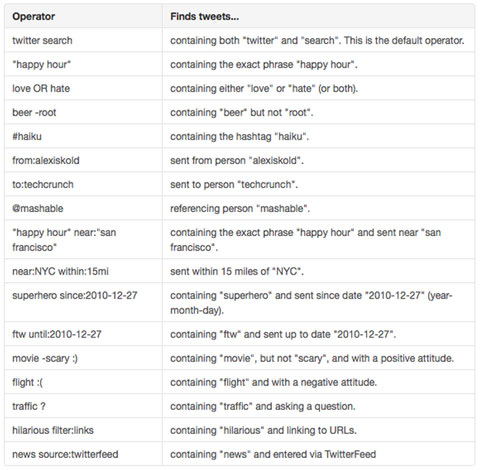
In this instance, Boolean search is great for searching specific brand names in quotations. You can get more specific with date searches, location and included hashtags.
Potential Uses
As an example, you can search for tweets within a geographic area. If there was a large power outage in Austin, Texas, the electric company could get an idea of where the outages are most prevalent by searching:
“power out” near:Austin within:15mi
They could then respond to these tweets to give customers more information about when the power will be turned back on.
It's important to note that when you include more than one word in a search, Twitter defaults to the AND operator. So, in the search:
Austin “ice cream” coupon
Get World-Class Marketing Training — All Year Long!
Are you facing doubt, uncertainty, or overwhelm? The Social Media Marketing Society can help.
Each month, you’ll receive training from trusted marketing experts, covering everything from AI to organic social marketing. When you join, you’ll also get immediate access to:
- A library of 100+ marketing trainings
- A community of like-minded marketers
- Monthly online community meetups
- Relevant news and trends updates
Twitter is searching for:
Austin AND “ice cream” AND coupon
You can also locate dissatisfied customers. If your company makes blenders and had a massive recall, you could help any distressed customers who were complaining about the recall experience or their blender on Twitter with this search:
“BlenderMax5000” sucks OR recall
This would capture any tweets that mention the blender by name, along with the word “sucks” OR the word “recall.” To cover your bases, include regular misspellings and mentions of the company's Twitter handle as different variations to make sure you see the largest majority of tweets:
“blender 5000” broke
“bender5000” @blendcorp recall
Twitter uses autocomplete in its searches, so instead of hitting Enter after you enter a search term, scroll down to “Search All People on Twitter” at the bottom of the autocomplete pop-up. At the next screen, select Everything to see all tweets containing your operators.
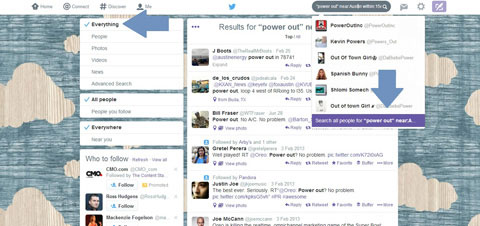
As with any type of Boolean search (but with Twitter especially), it's important to try several different variations of hashtags, spellings and sentiment words in order to capture the largest number of tweets possible.
#2: Drill Down to Specific Matches on Facebook
Facebook's search isn't as flexible as Twitter's, as its search fields are regimented. Additionally, Facebook doesn't accept the majority of Boolean search operators like Twitter does.
Open Graph allows users to search with natural language, instead of phrases with words in between. You can search Facebook's Open Graph to identify specific users with a relationship to a company or users who have interests that apply to your industry in a specific geographic area.
According to Tom Whitnah, a Facebook engineering manager, Facebook's graph search only accepts the AND and NOT operators.
It doesn't accept Boolean searches with the OR operator. The example Whitnah uses is:
“Google employees who went to Stanford OR Berkeley”
When you try to use the OR operator, it focuses on the second term as the location operator.

As for using NOT, it only works when you search your existing friend network, such as:
“BuzzFeed employees who are not my friends”
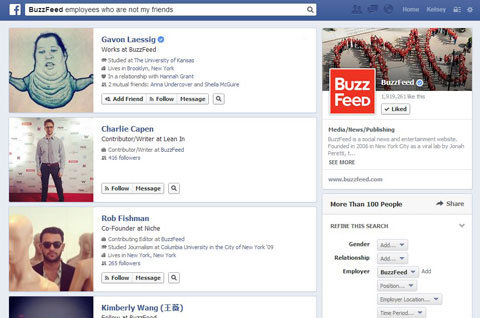
You can use other common operators to further refine your search by gender, hometown, name and others. A useful feature that lets you search your own employees to see who has added your company on Facebook, or to acquire potential networking, sales, or press contacts.

Discover Proven Marketing Strategies and Tips
Want to go even deeper with your marketing? Check out the Social Media Marketing Podcast! Publishing weekly since 2012, the Social Media Marketing Podcast helps you navigate the constantly changing marketing jungle, with expert interviews from marketing pros.
But don’t let the name fool you. This show is about a lot more than just social media marketing. With over 600 episodes and millions of downloads each year, this show has been a trusted source for marketers for well over a decade.
Potential Uses
For example, if you wanted to establish a partnership with BuzzFeed and wanted to target your email to the correct person, you could use Facebook Boolean search to find out who the advertising manager is.
Open Graph can also be used to find specific users for an online campaign who have interests that relate to your product or service. If a California yogurt company wants to create a blogger campaign specifically in California, sending bloggers free product in exchange for a review post, they could search:
Bloggers who live in California AND like yogurt
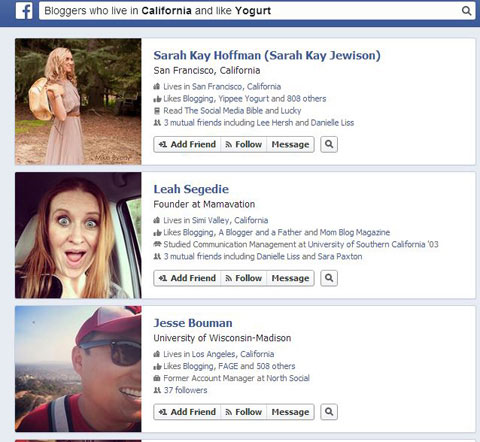
Graph search is also great for helping you identify matching interests of target markets when you're brainstorming new campaigns. For instance, if lovers of kayaking also love camping, you know that your kayaking company can successfully host a tent giveaway or partner with a camping tour company to offer an exclusive package.
With millions of users on Facebook around the world, Boolean search and Open Graph search now allow companies to learn more about their target user base than ever before. Just don't make it creepy or too intrusive, even if a user's privacy settings are all set to public.
#3: Track Sentiment and Reputation on Google+
Because Google automatically allows all of Google+ to be searched (like Twitter), it's a great place for analyzing brand sentiment, customer service engagement and communication.
Google+ uses basic Boolean search terms like AND, exact phrase quotation mark searches and OR and NOT terms.
Users can customize their search to look at everything or narrow results down further to show just people, communities, pages, photos, etc. If a company wants to see all of the good things people are saying about their products, they can search the product in question, along with positive brand sentiment words such as love, like this:
“Samsung tablet AND love”
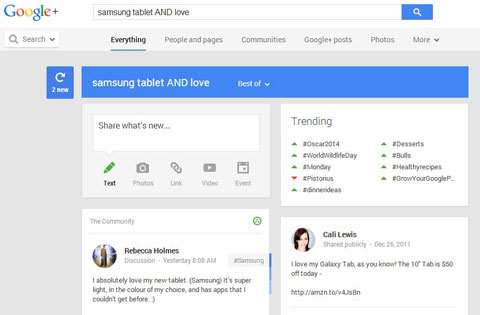
In addition to allowing users to add their own hashtags to posts, Google also automatically adds them to some posts. In the image above, #samsung was added.
Searching for your company name or industry keyword with a hashtag can help you see even more posts about your products or target keywords. Just remember, the user may not have added the hashtag, so approach your engagement with them accordingly.
Besides searching the content of posts, when you click on the More tab at the top of the search results, Google+ also allows you to drill down specifically to +mentions of your Google+ account, as well as events and hangouts.
Potential Uses
Boolean search on Google+ will let you track brand sentiment and negative posts from customers. You can also search brand names and popular hashtags to see where and how customers are using your products or services. This is a great way to get marketing content or campaign ideas.
For example, if the Ritz Carlton wants to see vacation photos people are taking at their resorts, they can search things such as:
Ritz Carlton AND #vacation
#RitzCarlton AND #vacation
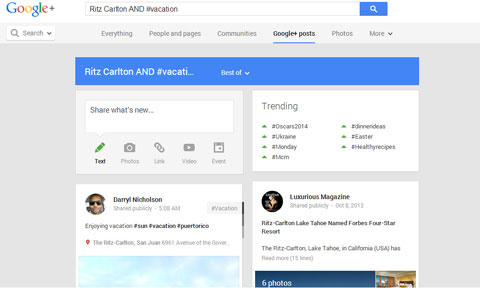
The results provide the company with a personal look at how people feel about their resorts while they're on vacation, and also provides a plethora of photos and user-generated content they can share on their own Google+ pages (especially if they have multiple pages for each property).
#4: Search Everywhere Else
If a company wants to get a good overall view of what people are saying online, using Boolean terms on aggregate search sites is also a good option.
SocialMention is a free search tool that allows basic Boolean search operators or field entry in its Advanced Search field if you can't remember proper operations. (Editor's Note: SocialMention is no longer an active online tool.)
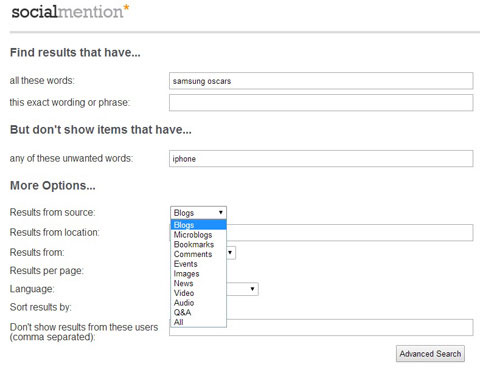
SocialMention will search the entire web or you can filter search results by source, as seen in the drop-down in the above screenshot.
With every brand search result, SocialMention also includes four metrics that provide a high-level view of how a brand is seen online. This is an extremely useful feature when you search by exact brand or product name for vetting or reputation management purposes.
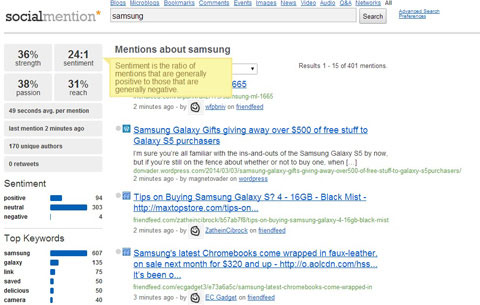
Hovering over each metric brings up an explanatory pop-up. These search results show brand-related content from everywhere users are active online: blogs, comments, Twitter, etc.
In Closing
Social media is a great tool for getting instant feedback or finding content for your company. Take advantage of the advanced search operators in Boolean search to get the most specific results possible.
You'll serve people better when you know more about your customers' likes and dislikes.
What do you think? Did I miss any great search tools or services? Let me know in the comments!
Attention Agency Owners, Brand Marketers, and Consultants

Introducing the Marketing Agency Show–our newest podcast designed to explore the struggles of agency marketers.
Join show host and agency owner, Brooke Sellas, as she interviews agency marketers and digs deep into their biggest challenges. Explore topics like navigating rough economic times, leveraging AI, service diversification, client acquisition, and much more.
Just pull up your favorite podcast app, search for Marketing Agency Show and start listening. Or click the button below for more information.

